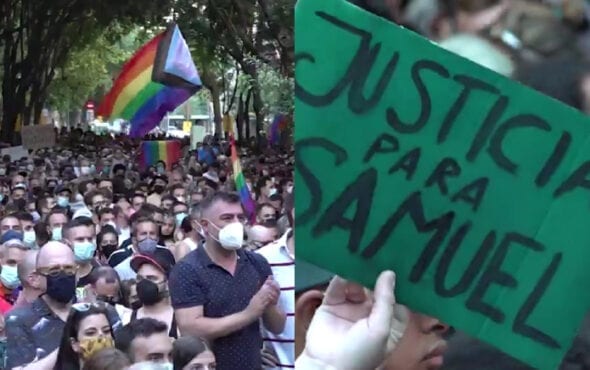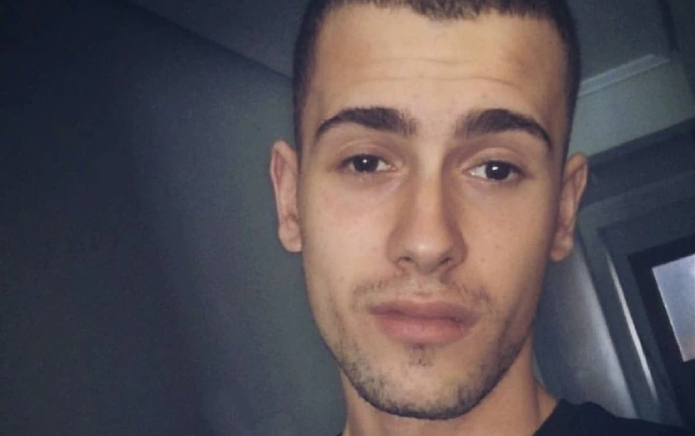
Alejandra Aguado has started to think twice about what to wear when she goes out in Spain for fear of being attacked for being a transgender woman amid rising violence against LGBTQ+ people.
“I’ve changed the way I dress and wear make-up. I’m less suggestive, less flamboyant,” the 23-year-old told the Thomson Reuters Foundation from the southern city of Seville.
“I’m more scared to face certain situations. And it’s not because I’m not brave enough – I can take that and much more, honey. But look at what happened to Samuel.”
In a suspected anti-gay hate crime, Samuel Luiz, a 24-year-old nursing assistant, was beaten to death outside a nightclub in the early hours of Saturday in the northern city of A Coruna.
A witness who was interviewed on La Sexta television said one of the assailants shouted homophobic slurs during the attack. Police have arrested three people over the killing.
Protesters took to the streets across Spain on Monday to vent their fury at Luiz’s death and to demand better protection for LGBTQ+ rights, with the far-right seeing the highest levels of support since dictator Francisco Franco died in 1975.
Government data shows 278 hate crimes related to sexual orientation or gender identity were reported in Spain in 2019, 8.6% up on 2018. LGBTQ+ rights groups say the true figure is much higher as many incidents are never reported.
Interior minister Fernando Grande-Marlaska said on Monday that hate crimes against the LGBTQ+ community had increased but a ministry spokesperson declined to provide further details.
“Many of the attacks we’re seeing now are in groups and in this case they’re more violent,” said Marc Serra, a councillor in Barcelona.
“Citizens end up feeling scot-free and committing attacks in broad daylight and even in front of witnesses,” he said, blaming the trend on the “normalisation of intolerant discourses”.

Samuel Luiz
Homophobia
Spain was the third country in the world to legalise same-sex marriage in 2005 and 89% of Spaniards say homosexuality should be accepted by society, a survey by the Pew Research Center found in 2020.
But many believe homophobia and transphobia have grown stronger in the traditionally conservative Catholic nation with the growing popularity of the far-right Vox party, which is aligned with populist movements elsewhere in Europe.
“Years ago, openly homophobic, transphobic or racist attitudes were unthinkable. Now it’s not a taboo anymore. They’re not ashamed of their hatred,” said Ruben Serrano, who wrote a book last year about attacks on LGBTQ+ people in Spain.
“The more visible we are, the more we occupy a space that they think belongs exclusively to them, the more violent their reaction is. It’s all about power and privilege.”
Vox did not immediately reply to a request for comment.
Founded in 2013 by former members of the mainstream conservative People’s Party (PP), which held power from 2011 to 2018, Vox is anti-Muslim, nationalist, anti-feminist, Eurosceptic and opposed to regional secessionist movements.
In 2019 elections, Vox pledged to curtail Pride parades, heaped ridicule on diversity lessons it wants to scrap in schools and even drew parallels between homosexuality and bestiality.
“Homophobes don’t feel repressed anymore, because they have a voice in parliament, in the media, everywhere,” said Carmen Garcia de Merlo, president of COGAM, a Madrid-based LGBTQ+ group.
The two right-wing parties gained ground in Madrid’s regional elections in May, which dealt a blow to the ruling Socialist Party for what many regard as its mishandling of the COVID-19 crisis.
“It felt like progress was underway and things would only get better in time, but that glass box is broken,” said Lucas Roman, a 26-year-old gay man in Barcelona who is thinking about taking self-defence classes.
“Before, you’d hear about these attacks in the news. Now the victims are friends of my friends, or even my own friends. The circle is closing down … I’m more scared to be openly gay than two years ago.”
Reporting by Enrique Anarte
GAY TIMES and Openly/Thomson Reuters Foundation are working together to deliver leading LGBTQ+ news to a global audience.



